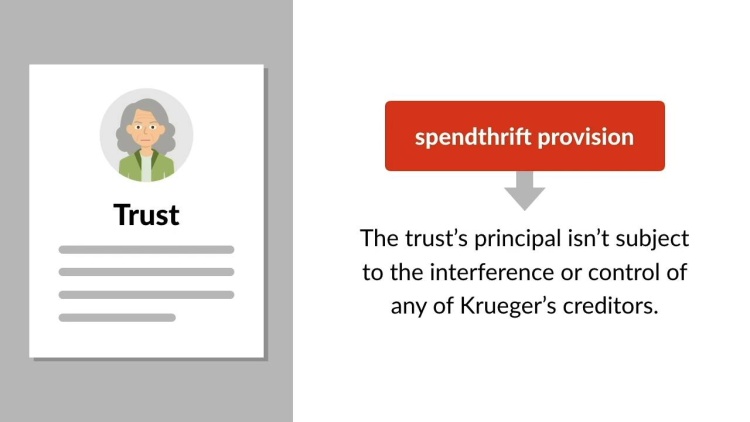Scheffel v. Krueger
New Hampshire Supreme Court
782 A.2d 410, 146 N.H. 669 (2001)

- Written by Christine Raino, JD
Facts
The superior court awarded Lorie Scheffel (plaintiff) $551,286.25 in damages for her tort claims against Kyle Krueger (defendant), who she claimed had sexually assaulted her minor child and videotaped and displayed the offense on the internet. Criminal charges were also brought against Krueger for the same alleged conduct. Krueger was the beneficiary of a spendthrift trust created by his grandmother under which the trustee was required to pay the net income of the trust “at least quarterly” and had sole discretion to release principal as needed for the beneficiary’s support, maintenance, and education. The trust further provided that Krueger, who could not access the principal directly until he reached the age of 50, was prohibited from transferring his future interest in the trust principle and income, voluntarily or involuntarily. The trust specifically provided that the trust principle and income could not be reached by creditors “prior to its receipt by the beneficiary.” Scheffel sought to satisfy the damages award against Krueger from his trust and brought an action against the trustee (defendant) claiming that the legislature did not intend RSA 564:23, the statute governing enforceability of spendthrift provisions, to preclude collection of damages awards for tortious conduct that also constituted criminal conduct. The trial court ruled that the spendthrift provision in Krueger’s trust applied to Scheffel’s damages award and dismissed her claim. Scheffel appealed, asserting (1) that the legislature did not intend for the spendthrift statute to apply to tort creditors, (2) that public policy provided grounds for creating an exception for tort creditors, and (3) that the trust must terminate because it could no longer satisfy its purpose of providing for the support, maintenance, and education of Krueger, who was expected to remain incarcerated for many years.
Rule of Law
Issue
Holding and Reasoning (Duggan, J.)
What to do next…
Here's why 907,000 law students have relied on our case briefs:
- Written by law professors and practitioners, not other law students. 47,100 briefs, keyed to 996 casebooks. Top-notch customer support.
- The right amount of information, includes the facts, issues, rule of law, holding and reasoning, and any concurrences and dissents.
- Access in your classes, works on your mobile and tablet. Massive library of related video lessons and high quality multiple-choice questions.
- Easy to use, uniform format for every case brief. Written in plain English, not in legalese. Our briefs summarize and simplify; they don’t just repeat the court’s language.





